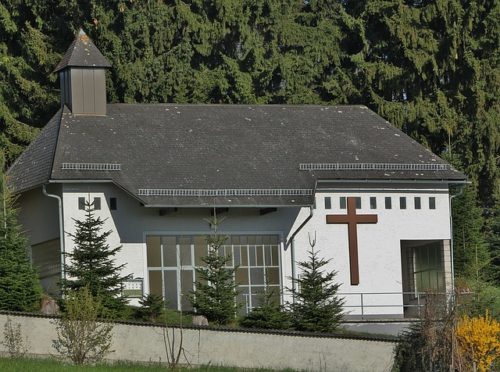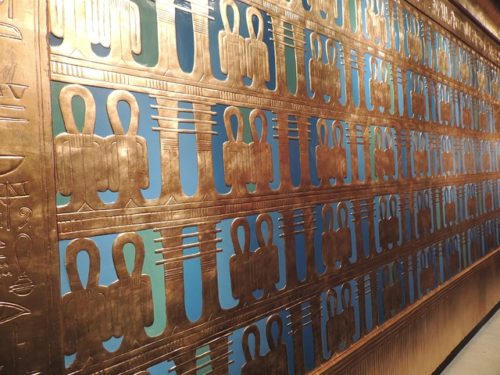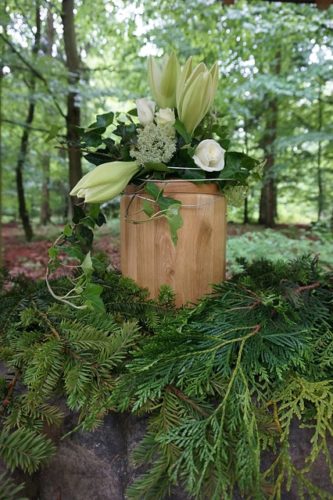![]()
For every Pagan, Heathen, or Polytheist who takes care of the ill, the dying, and the loved ones of coven, clan, grove, as well as those who are solitary in their practice, there is the uneven bridge of connection during the time of final rites. Many who come to a variety of Pagan traditions were not born into them; in fact, even for those who are born into a tradition, there may be grandparents, aunts, uncles, cousins, and estranged elders who will attend a ceremony of final rites as a matter of closure. Funeral rites and memorial services are a time of tricky navigation between those who understand and reflect on the importance that the decedent’s faith holds even in matters of death, and those who hold steadfast to tradition from the decedent’s family of origin regardless of how unwanted it may be.

[Pixabay.]
When your family sees your religious choices as a matter of eternal damnation or a slight to the family overall, then there might be a few problems when that same family gains control over the end of life practicalities such as where you will live when you are dying, whether a clergy person of your faith tradition will be on hand to help you through the end, and whether your final rites will be in accordance with your wishes, especially when those desires are in opposition with your family’s beliefs.
No one wants to talk about this;however, death visits all. One of the purest forms agony on earth would be to die and to be buried with rites for a faith no longer practiced, or perhaps even hated.
One of the best funerals that I have ever seen was of a woman whose non-Pagan family so respected her wishes that they had a blended funeral with two officiants. The friends and those who cared for her in the end were as welcome as the family of blood that did not share her faith in the same way, but did share her love and vibrant attitude towards life. This compromise with multiple ceremonies pacified both the family of origin and the decedent’s religious family.
While this may be the ideal ending for some, there are many who know in their hearts that if certain arrangements are not made in advance, then the alternative remains a ceremony of faith that stains and tarnishes the very essence of the deceased. Is this wrong? Absolutely.
Does it happen? Unfortunately, it does.
Perhaps the decedent’s wishes were unknown or misunderstood. The default goes to a family-of-origin funeral, or no funeral at all. If loved ones disapproved of the worship practices of the deceased, then the service transforms from a celebration of the life to a final attempt to bring the dead back into the family fold of religion. The irony is that the one person who might clear up the entire issue is no longer present.

Christian church [Pixabay].
This came up in planning a second set of funeral rites for my mother in her old neighborhood. Family, former neighbors, and her closest girlfriends would attend. Some would bring oxygen, wheelchairs, and walkers; others would bring the repast of food, tea, scones, and lemon cake. I wanted to honor her tradition even though it has been over 30 years since I have claimed any adherence to that religion. In my pursuit of a polytheistic path, I respect and revere my ancestors and my living elders, but I make a “joyful noise” unto the many gods whom I worship. This last set of rites was an in-your face reminder to me of how family relations from years before could set the tone of what is expected.
As a polytheist, I called upon Hecate and Hestia for advice regarding how to balance a ceremony for a faith that I could not embrace with the need to honor the life and faith tradition of my mother. The answer was to follow the very tenets of Christianty (African-Methodist-Episcopalian) that my mother, my mother’s mother, and her entire family had followed from cradle to grave: I called two female cousins and let them guide writing of the service. Some things were easy: pray, sing, pray some more, sing some more, recall a bit about the deceased, have several people speak, read a few condolence cards, have family speak, pray some more, preach the message, invite those who did not know Jesus to come forward, sing some more, pray some more, and eat.
My mother in life was understanding about my call from the gods and my devotion to them. She never said a word, except, “Thank you,” or, “I love you.” I never demanded that she leave her love for her god; she did not tell me that I was going to hell for not embracing Jesus.
As a result, the service was absolutely delightful. There is a familiarity about an officiant in a robe, the sound of hymns, and the repast after the service where all gathered can get to know each other and reminisce about the recently departed loved one. While the first set of rites held in the city where my mother died was a brief and charming memorial service, the second was a traditional, culturally black service squeezed into a smaller time span. Both served their audiences; more importantly, they reflected the relationship of the decedent with those attending. The latter service consisted of family members who were ministers, missionaries, and devout adherents to the most traditional forms of Christianity in the black community.
It was not a question of whether there would be an officiant, but rather which relative could and would deliver a brief (under 20 minutes) eulogy and message during the time allotted. The hymns were all Methodist, commonly sung at each funeral. A close male cousin who leads his own church choir played the electric guitar and led each hymn, while his wife sang harmony to his melodic tones. Another cousin who preaches in drug-dealing neighborhoods, and helps men who are getting out of prison, connected the decedent’s love of the Christian bible with a traditional sermon encouraging love for and surrender to Jesus Christ.
Several relatives interrupted the comments section with positive memories of the loved one. The service ended with an invitation, while heads were bowed and eyes were closed ,to raise a hand if there was a desire to invite Jesus Christ into one’s life. Although no hands apparently went up, there were still several engaging conversations about acceptance of that god (specifically Jesus Christ) in one’s life around the room after the service. Many praised the service as their second or third time to worship for the day. For those present, the only reason to leave was due to darkness, with plans made for some to continue worship at a later time on a different day. The two services, while different, emphasized more how those who mourned chose to worship the deceased and what was expected. While the latter was not a full funeral, it was acceptable and rather short, at just over three hours.
For my own rites, when they come, I know that while the flavor of the service may be that of the traditional black funeral, the gods mentioned and worshiped will be far from what anyone in my family would understand or enjoy. There are rites in our tradition; moreover, there are those who can perform those rites. In preparing for the final rites of my mother, I saw what might not work for those who claim any tradition beyond that from a family of origin.
In care-giving,the focus on ensuring peace, calm, and a good end of life for the recipient does not end when the loved one dies. The healing progresses to caring for the self after the extended time of caring for someone else ends. Caring for the self includes reevaluating how to relate to family who might not accept or understand one of the most intimate relationships possible: the tie between religious choice and the self.
It does not take a death to think about how one wishes to be buried or treated at the end of one’s life. Without proselytizing, one way to start would be to put wishes in writing and to make major choices well known to all before severe illness or death. Consider how and where an obituary for one’s own death might appear. Where would rites occur? Would it be in the back yard at home? Would it be in a chapel? Would it be by the ocean? Setting aside a life insurance policy, money, or even barter methods to pay for a natural funeral, might be the difference between a funeral that would be acceptable and a nightmare. A final step might be finding at least a few friends who can explain to family in a neutral, non-confrontational manner how and why the deceased preferred worshiping Horus, for example, would be helpful. This can help combat misleading stereotypes about the importance of ritual in many Pagan traditions.

Due to time constraints or emotional boundaries, there may be times when such a compromise just is not possible, or when even three or four sets of rites may be done with a rift remaining due to the nature of the relationship between the one who passed on and those who mourn and remain.
Sadly, when choosing a path, Pagan, Heathen, Polytheist, or anything at all, death rites are something that might be mentioned, but they usually aren’t a focus for many in the beginning. Life is the complement to death, yet the former is more popular and better understood. As our population ages, short of having larger communities and strictly Pagan or non-monotheistic elder care centers, the issue of how to balance the needs of the deceased with the needs of the non-Pagan family will remain an underlying problem for many.
There are ways of showing love without having faith and religious practice as wedges between family members. While my hope is that every funeral rite or memorial service will be one where the family honors and thinks of the decedent’s desires first, no matter how strange or abhorrent to the ones who are left behind, it will take time to make this a reality. At times, the best is to hope for a draw while our traditions become more familiar to the ones we love and who knew us as children or babies; the worst is to remain compartmentalized to the detriment of family, the funeral rites, and those who care for the loved ones.

* * *
The views and opinions expressed by our diverse panel of columnists and guest writers represent the many diverging perspectives held within the global Pagan, Heathen and polytheist communities, but do not necessarily reflect the views of The Wild Hunt Inc. or its management.
The Wild Hunt is not responsible for links to external content.
To join a conversation on this post:
Visit our The Wild Hunt subreddit! Point your favorite browser to https://www.reddit.com/r/The_Wild_Hunt_News/, then click “JOIN”. Make sure to click the bell, too, to be notified of new articles posted to our subreddit.
Pingback: Column: Family, Final Rites, and Care-giving — The Wild Hunt | Hestia's Servant